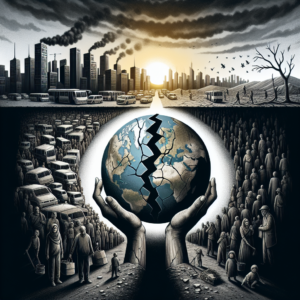Mass Rape Case of Gisèle Pelicot: A Reflection on Humanity and Justice
In a harrowing case that illustrates the darker aspects of human nature, 50 men find themselves accused of participating in the mass rape of Gisèle Pelicot, a woman whose husband allegedly drugged her for a decade. These individuals, ranging from everyday citizens like firefighters and lorry drivers to a journalist and a DJ, are set to face sentencing today. Collectively, if found guilty, they could face more than 600 years in prison.
The striking diversity among the defendants—young, old, black, white—highlights a troubling reality. They represent a cross-section of French society, referred to colloquially as "Monsieur-Tout-Le-Monde" or "Mr Everyman." This designation prompts a profound inquiry: how could ordinary individuals, whom one might easily encounter in everyday life, become embroiled in such a horrific crime?
As the trial unfolds, the defendants have shown mixed reactions, with some appearing defiant while others gaze downward, seemingly lost in thought. Their connection to the local community, coming predominantly from nearby towns of the Pelicots’ village in Mazan, raises the question of accountability. Defense lawyers have argued that the men’s ordinariness may play a pivotal role in their case, suggesting that "ordinary people do extraordinary things."
Reflecting on the gravity of this situation invites us to examine the biblical principle of the inherent potential for both good and evil within every individual. Jesus taught us that the heart of humanity is complex, warning against judgment while calling for mercy and repentance. In Matthew 7:1-2, He shares, “Do not judge, or you too will be judged. For in the same way you judge others, you will be judged.”
This case serves as a stark reminder of the consequences of choices made in darkness, urging us to reflect on the moral compass that guides our actions. The defendants’ actions starkly contrast the teachings of compassion, integrity, and respect for one another—the very qualities that Christ exemplified in his time.
As we navigate tragic narratives like this one, we are called to not only seek justice but also to foster a culture of accountability and redemption. Every individual’s story is intertwined with the fabric of humanity, and within that intricate weave lies the potential for both destruction and healing.
In conclusion, let this case compel us to evaluate our own lives and the choices we make. How can we embody the principles of love and kindness that Jesus advocated? By consciously choosing to uplift one another, we contribute to a society where acts of compassion outshine those of brutality. As we reflect on this troubling story, let us remember the hope for redemption and the power of forgiveness that lies within each of us.
Explore and dig up answers yourself with our BGodInspired Bible Tools! Be careful – each interaction is like a new treasure hunt… you can get lost for hours 🙂


